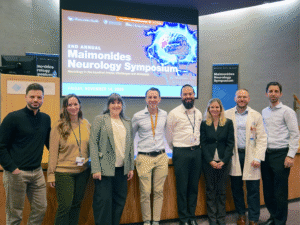Research has shown that colorectal cancer can spread to the liver in 15% of people by the time they are diagnosed (1). For adult patients with this condition, or with unresectable intrahepatic cholangiocarcinoma (bile duct cancer) that has spread into the liver or can’t be removed, Hepatic Artery Infusion (HAI) has been increasingly adopted by cancer centers nationwide. It is now available to patients in Brooklyn at Maimonides Cancer Center.
This life-saving therapy, in which chemotherapy is administered directly into the liver through a surgically implanted pump to the hepatic artery, offers many cancer patients new hope. A study found that surgery may be the only cure for colorectal cancer that has spread to the liver (2). In some cases, patients have tumors that are too large to operate on; this treatment can shrink tumors so they can be successfully removed surgically.
HAI therapy has been used safely for 25 years in thousands of patients. In recent years, an increasing body of clinical evidence and modernized HAI therapy protocols have led to increased adoption of this procedure.
“We’re proud to be able to offer this state-of-the-art treatment to our patients. It’s a reflection of the teamwork of all departments involved in providing this exceptional care,” says Susan Burdette-Radoux, MD, Interim Director of Hematology & Oncology at Maimonides.
First and Only in Brooklyn
In November of 2024, the first patient had successful pump placement by our hepatobiliary surgical team and successful refill at Maimonides Cancer Center. This was also the first patient to receive HAI therapy in the borough of Brooklyn. By the end of February, six patients had been treated with hepatic artery pumps at Maimonides. The surgical implantation of this pump requires specialized skills, and lately is being performed using minimally invasive and robotic surgical techniques.
“It’s difficult for many members of our most vulnerable patient population to travel to receive HAI treatment, especially those who don’t speak English, but now they can stay in their own borough close to home,” says Jim Huang, MD, Program Director of the Oncology & Hematology Fellowship at Maimonides. “Patients receiving this treatment need to go into the office for multiple appointments each month, so it’s really opening a new door for patients in Brooklyn.”
Fewer than 1% of hospitals in the U.S. offer this procedure. As of March 2025, in addition to being the only hospital in Brooklyn to offer HAI therapy, Maimonides is also only one of three in New York City. This groundbreaking effort is a reflection of our exceptional leadership in cancer treatment and surgery at Maimonides.
Patient-Centered Care Throughout a Complex Treatment Process
Before beginning this therapy, each patient is assessed by a multidisciplinary team of specialists including surgeons, medical oncologists, radiation oncologists, radiologists, and gastroenterologists. Coordination among departments is essential for success, since it is most effective when administered in coordination with surgical treatment to remove tumors.
“This treatment can be received simultaneously with systemic chemotherapy, radiation therapy, loco-regional radiology intervention, and surgical procedures, including liver resection,” says Vadim Nakhamiyayev, MD, PhD, Chief of the Maimonides Liver, Bile Duct, and Pancreatic Surgery program. “We work closely with every patient and their entire care team to determine the best course of action for their individual condition.”
Once a patient is determined to be a good candidate for HAI, a hepatic artery pump is implanted in the patient’s abdomen near the liver. When the propellant is warmed by their body, it causes the medication to flow out of the inner chamber, through the catheter, and directly into the liver through the patient’s hepatic artery (3).
The hepatic artery pump has 4 main parts:
- The septum is a raised area in the center of the pump where medication is inserted.
- The inner chamber holds the medication, which is a type of chemotherapy.
- The outer chamber holds a liquid called a propellant.
- The catheter is a small, flexible tube. It connects the pump to the patient’s hepatic artery.
Hepatic artery pumps hold enough medication for 2 weeks and must be refilled on the 14th day.
Benefits
An advantage of HAI is that it is a targeted therapy, unlike chemotherapy, which is usually given intravenously. The IV dosage is diluted throughout the entire body, and must be limited to reduce toxicity as such. This leaves only a fraction to reach tumors in the liver. HAI pumps chemotherapy directly into the liver, making it possible to target the tumors with much higher doses — up to 400 times higher than can be achieved through IV administration. Any amount not absorbed by the tumors is then metabolized by the liver, reducing side effects for other organs and tissues.
In addition to being used before surgery to shrink tumors, patients can also see benefits from receiving HAI treatments after surgery to kill any lingering cancer cells, or instead of surgery for liver tumors that are too extensive or numerous to be removed. By shrinking or even eliminating tumors, this therapy may extend patients’ lives, ease their symptoms and, in some cases, even keep the tumors from coming back.
“This is a targeted procedure for colorectal and bile duct cancer with liver metastasis. Sometimes, it can be the only optimal and less toxic therapy, so many patients can benefit it and still tolerate it well despite the advanced stage of their disease,” said Dr. Nakhamiyayev. “Creating access to this therapy here in Brooklyn will help many of our patients to live longer and maintain a high quality of life after their cancer diagnoses.”
To learn more about gastrointestinal, colorectal, and liver cancer care at Maimonides, visit https://maimo.org/treatments-care/cancer-center/gastrointestinal-and-liver-cancers/. To refer a patient for HAI treatment or related care, call (718) 765-2500.
- https://cancerblog.mayoclinic.org/2023/05/04/colorectal-cancer-in-the-liver-new-treatment-gives-more-people-hope-for-a-cure/
- https://www.medicalnewstoday.com/articles/colorectal-cancer-with-liver-metastasis#support
- https://www.mskcc.org/cancer-care/patient-education/about-your-liver-infusion-pump




